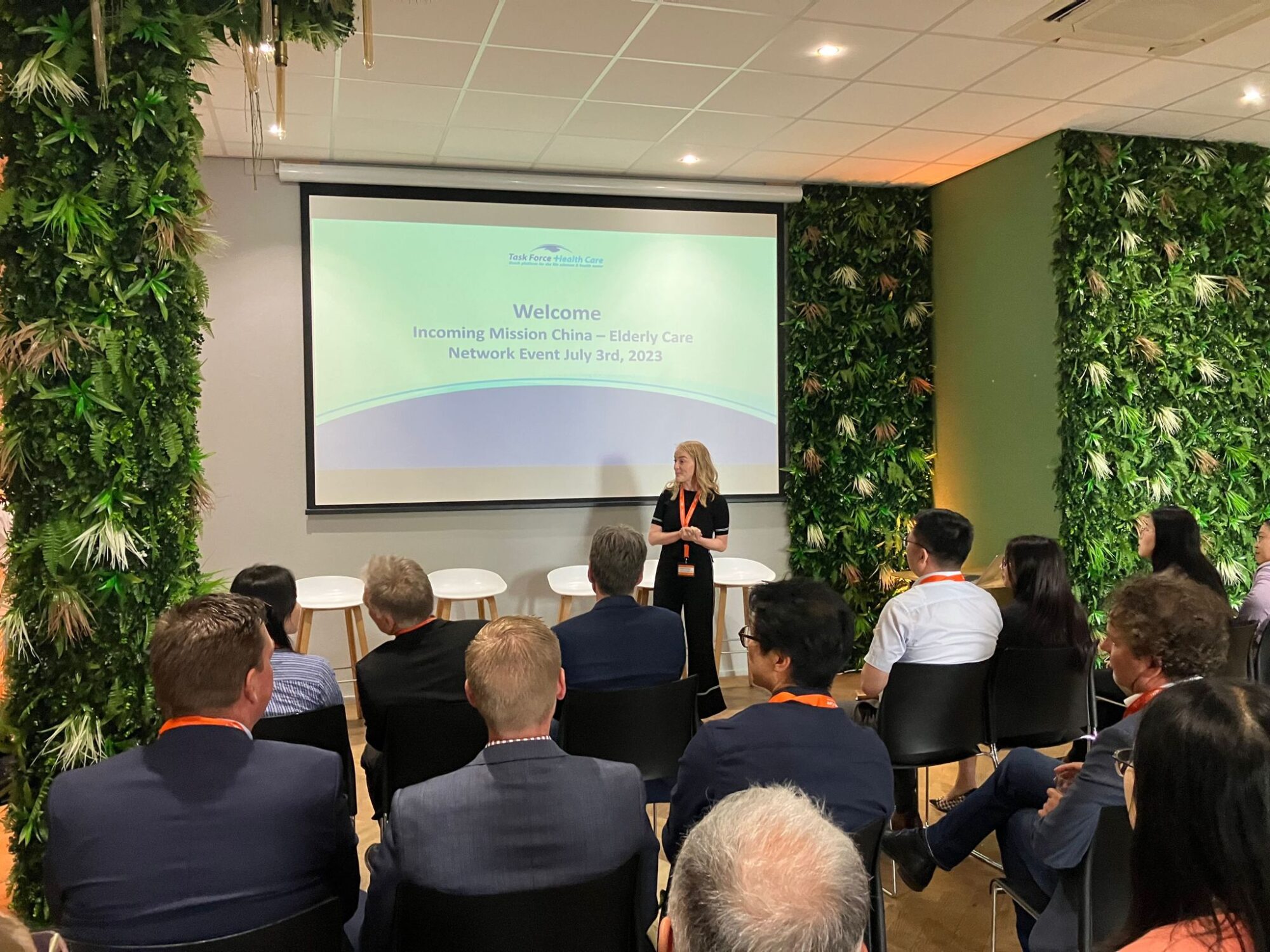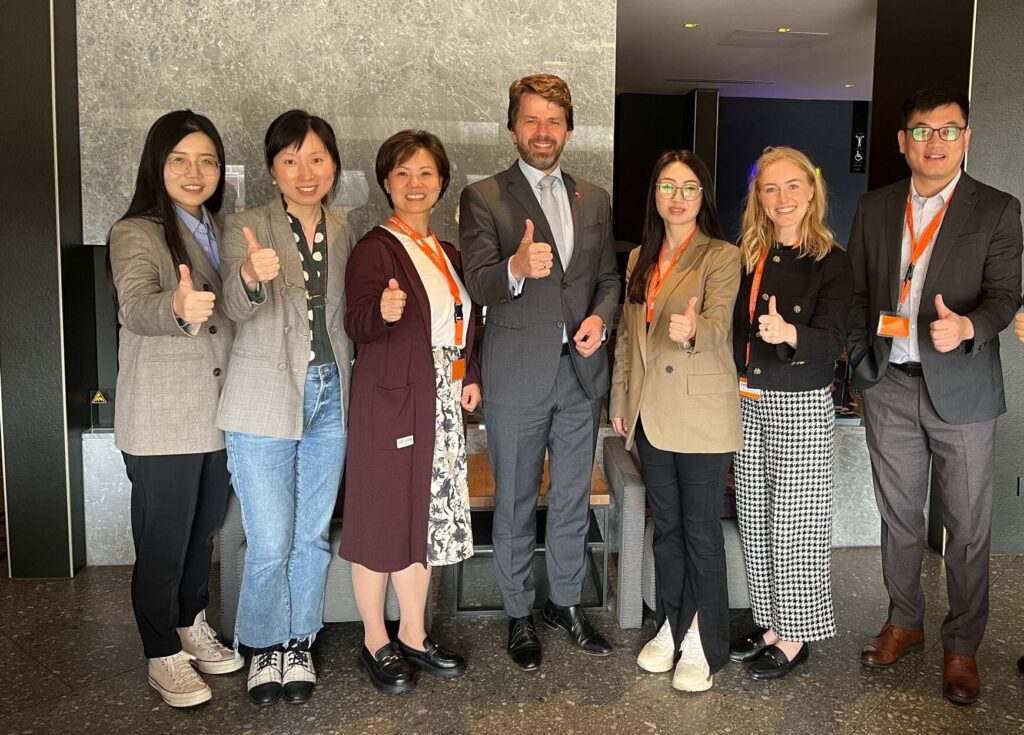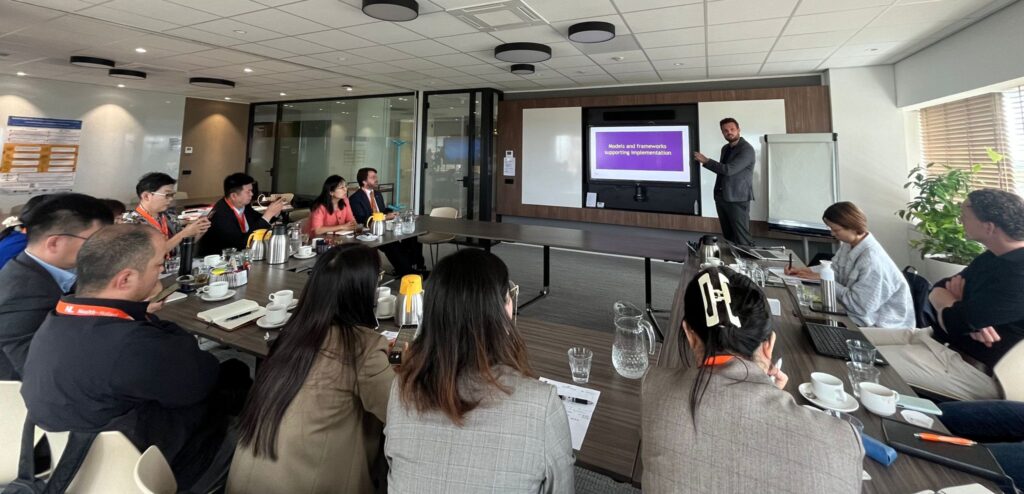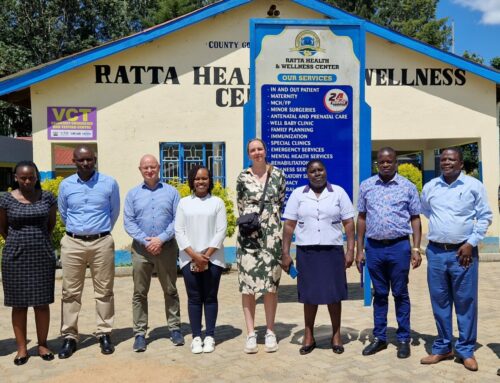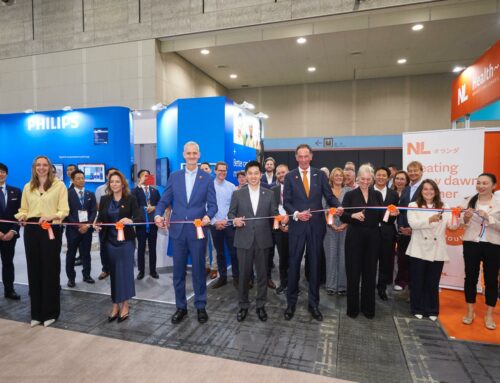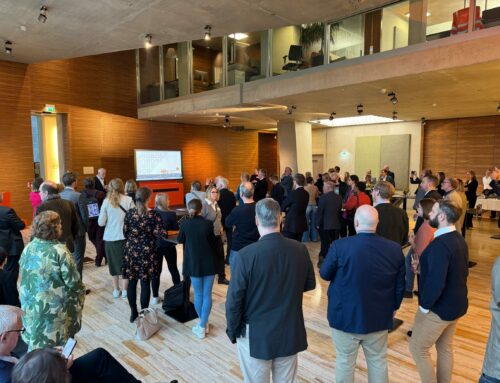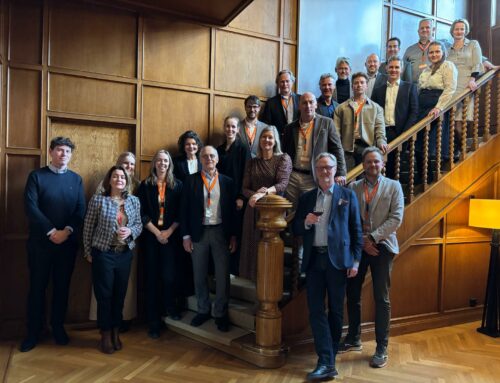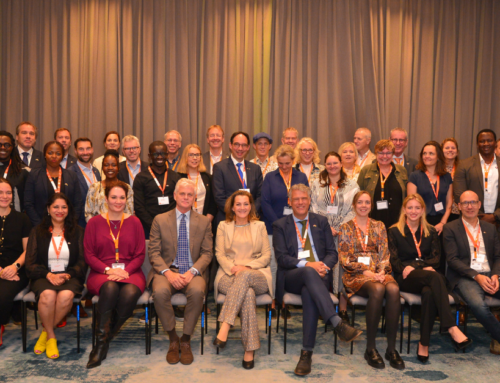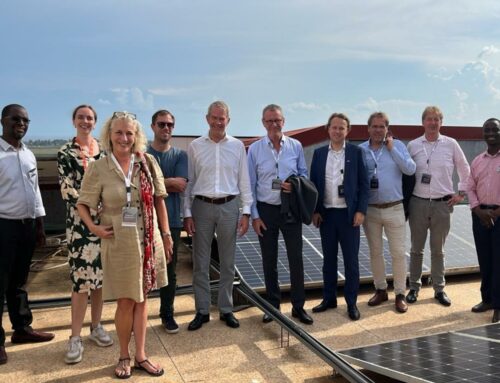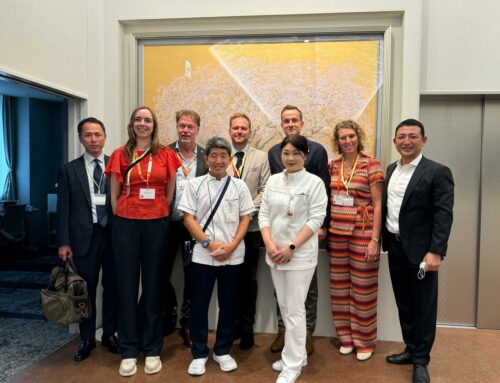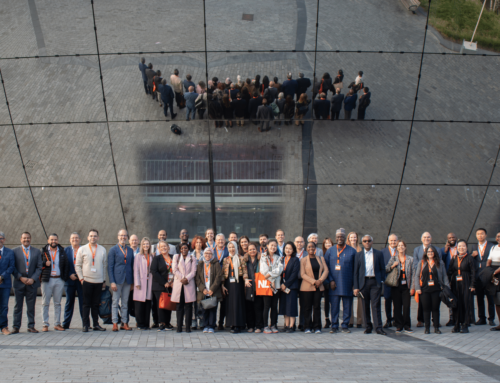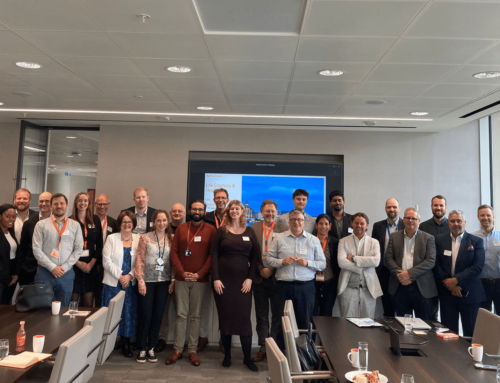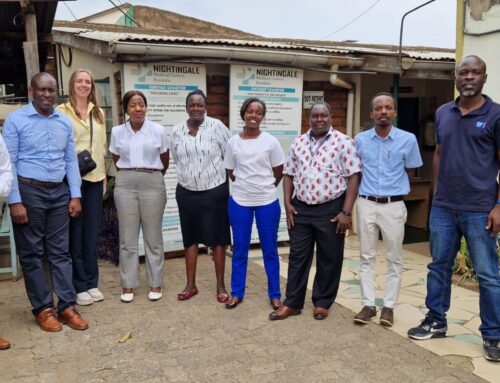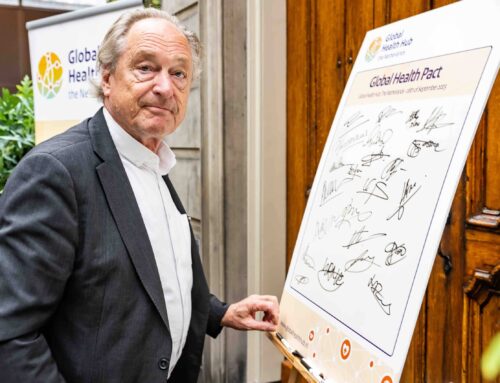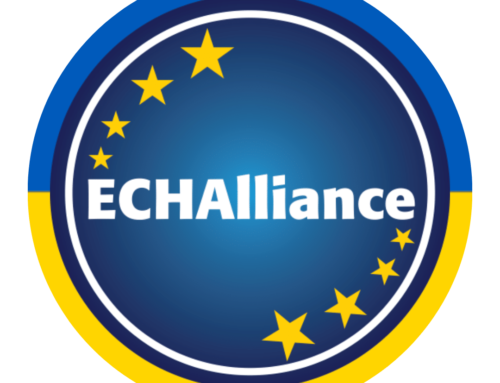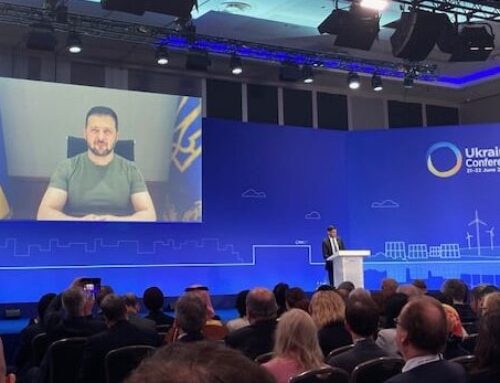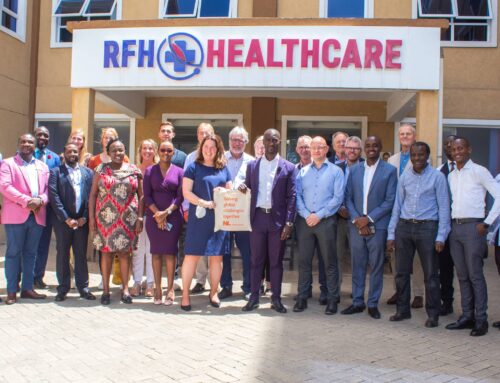With a shared interest in addressing the challenges of ageing populations, this past week Task Force Health Care (TFHC) alongside the Embassy of the Kingdom of the Netherlands in China, were able to welcome a high-level delegation from Beijing, Tianjin, and Shanghai. The objective was to showcase Dutch expertise in providing high-quality elderly care services and products to enhance bilateral collaboration. During this time, advanced operational concepts, innovative technologies, and successful care service models were highlighted through travel around the Netherlands and joining forces with Vilans, Stichting Humanitas Rotterdam, Stichting tanteLouise, Laurens, UMCG, Botmas, and Interzorg Noord Nederland.
These visits emphasized the importance of integrating technology and interdisciplinary approaches to show how care can be tailored to meet the specific needs of elderly individuals. This trade mission was an exceptional platform for the two countries to deepen practical cooperations. The match-making opportunities that were provided between designated Dutch players in the care-sector and the visiting Chinese stakeholders displayed a readiness for cooperation on varying subjects.
Subjects that gained the most traction during this LSH visit included dementia care, digitalisation in the care environment, and collaborative innovation.
Dementia Care
China faces significant challenges in dementia care, as it has the highest number of individuals with dementia globally. These challenges include low public awareness, limited knowledge among medical professionals and caregivers, an underdeveloped service system, and high costs of care. To tackle these issues, China is implementing measures to enhance dementia awareness and education among the public and care providers. Regular education and training activities for health professionals are a way to build dementia care service capacity in primary care. The delegates, who were actively engaged in discussions on fostering collaboration between care organizations and on-pharmacological interventions, asked insightful questions to bring home. The delegates’ approach was to gain an understanding of how to translate the Dutch approach to the Chinese care setting. What was brought to light was that a systematic approach to dementia care needs to be taken, and that the focus needs to shift towards training more professionals and caregivers; both regarding care giving models and early detection of dementia. This was highlighted during our visits with tanteLouise, Vilans, Interzorg Noord Nederland, and UMCG.
Digitalisation in the Care Environment
In the healthcare sector, digitalisation is starting to tackle significant inequalities in the availability of highly skilled doctors and technological advancements. China has made remarkable progress in employing digitalized solution-based approaches to enhance healthcare access and quality in recent years. However, it continues to grapple with challenges, including a pronounced healthcare divide between rural and urban areas, as well as a swiftly aging population. Recognizing the need for continued growth and improvement, the Chinese delegation was eager to explore opportunities for collaboration and gain insights into the latest digital innovations being introduced in Dutch care settings. By understanding and leveraging these advancements, China aims to further bridge the gaps in healthcare delivery, especially for underserved populations and the elderly, ultimately striving for better health outcomes and enhanced well-being for its citizens. In the Netherlands, we learned about companies such as Wolk Airbag, Genus Care, Momo BedSense, CogvisAI, Exoskelton, Tinybots, and Medicine dispenser. These newer technological solutions work to give day-structure support, focussing on both the efficacy and efficiency in caregiving.
Collaborative Innovations in Healthcare: Pioneering Together for Progress
The third topic that was highlighted during this trade mission was the high level of collaboration that is seen in the Netherlands when introducing new technologies to the care or cure market. The Netherlands has established a remarkable ecosystem that promotes seamless coordination among various stakeholders involved in piloting, financing, knowledge sharing, research, and development. One delegate stating he was impressed by the Dutch “harmonized systems and approaches” to care and cure settings. This interconnectedness sets the Netherlands apart from China, positioning it as a frontrunner in fostering innovation within the healthcare sector. Strong emphasis is placed on creating an environment where all parties can actively participate in the pioneering process. This integrated approach not only accelerates the introduction of cutting-edge technologies but also facilitates the smooth transition from research and development to practical implementation. Chinese delegates’ interest in piloting new products and introducing new solutions demonstrates their recognition of the opportunities presented by collaboration with the Netherlands. By seizing the opportunity to learn from the presentations and to connect with the visited facilities, they can harness the expertise and experiences of the Dutch healthcare ecosystem to drive innovation and enhance the care realm in China.
Particular visits that tackled all three of these topics included tanteLouise’s Zorglab, and Vilans.
Stichting tanteLouise
Cooperation with China can be seen already in certain care settings within the Netherlands. Such as at tanteLouise, a leading Dutch healthcare organisation that offers a range of services including nursing homes, home care, geriatric rehabilitation, and hospice care, all with a focus on innovation. By incorporating the latest care technologies, such as their groundbreaking approach to dementia care, they aim to enhance the well-being of their clients while improving staff satisfaction, ensuring cost-effectiveness, and enabling individuals to participate in their communities for as long as possible. Their new conceptual care model ‘VanThuisUit,” is an example of collaborative design. VanThuisUit is the first care concept developed under the banner of ThuisWaarts by CZ care office, health insurer CZ and tanteLouise; a concept that was inspired by a mission trip to China.
More specifically, Jan-Kees van Wijnen, director at tanteLouise, took inspiration from a day care program in China due to the many activities offered by the day care to the elderly (music, games, relaxation, creative activities, etc.). He saw that this kept the elderly active with a sufficient sense of purpose so that it had a preventive effect regarding physical and cognitive decline. TanteLouise translated this to the Dutch situation and that is how ‘VanThuisUit’ came into being. The concept stresses ‘living longer, actively, and independently at home.’ They do this with introducing health innovations, by piloting new concepts, and staying up to date with the latest movements in the elderly care sector.
At tanteLouise they make sure to first look at what their elderly clients can do independently, so that tanteLouise can give them as much control as possible while supplementing them with the necessary extra care. Upon hearing this approach, active discussions started amongst the Chinese delegation surrounding the various approaches taken in China versus the Netherlands. This led to an excellent exchange of views, and a potential new activity to be introduced at tanteLouise: Taichi – a graceful form of exercise that’s now used for stress reduction and to help with a variety of other health conditions.
Vilans
Vilans, a renowned Dutch organization, specializes in providing comprehensive long-term care and support for elderly and disabled individuals within the Netherlands. Their expertise and knowledge are highly regarded, demonstrated by their successful implementation of nationwide programs such as the ‘National Dementia Program,’ the ‘Care for Better Program,’ and ‘Up to Care!’. With a primary focus on serving professionals and managers in various care organizations, including long-term care, primary care, social care, volunteer organizations, user organizations, health care insurers, and authorities, Vilans plays a crucial role in shaping the landscape of care services in the country. During the visit to Vilans’ office in Utrecht, the delegates gained valuable insights into the dynamic long-term care landscape in the Netherlands. They were able to witness a sense of urgency for change and the underlying principle of “solidarity” that guides Dutch healthcare practices. Engaging in fruitful discussions, the delegates explored the potential of digital care solutions, the pressing issue of dementia and its management, and Vilans’ analytical approach to evaluate the success of new products. Particularly intriguing was Vilans’ emphasis on co-design and co-creation, providing valuable lessons for Chinese knowledge institutes and generating curiosity about future collaborative opportunities. Overall, the visit to Vilans allowed the delegates to deepen their understanding of the Dutch long-term care system, exchange ideas on innovative care practices, and foster potential collaborations between Chinese and Dutch healthcare organizations.
The Netherlands will continue to proactively engage with China to foster cooperation and address the challenges in providing care for elderly populations.
China’s involvement in global health governance, specifically on the topic of elderly care, allows for the sharing of best practices, innovations, and policies related to the field. This is why active collaboration with international partners, including the Netherlands, can provide valuable insights into effective elderly care models, technologies, and strategies that can be adapted and implemented in China. As the Chinese delegates have seized the opportunity to connect with the facilities we visited and as learn from the Dutch experience, we hope they are able to embrace the Dutch approach to overcoming the challenges posed by the rapidly evolving healthcare landscape.
Find out more about this past mission trip here.


